外研版八下英语Module 1 Feelings and impressions Unit 2 I feel nervous when I speak Chinese .课文语法点课件(共25张P
文档属性
| 名称 | 外研版八下英语Module 1 Feelings and impressions Unit 2 I feel nervous when I speak Chinese .课文语法点课件(共25张P |
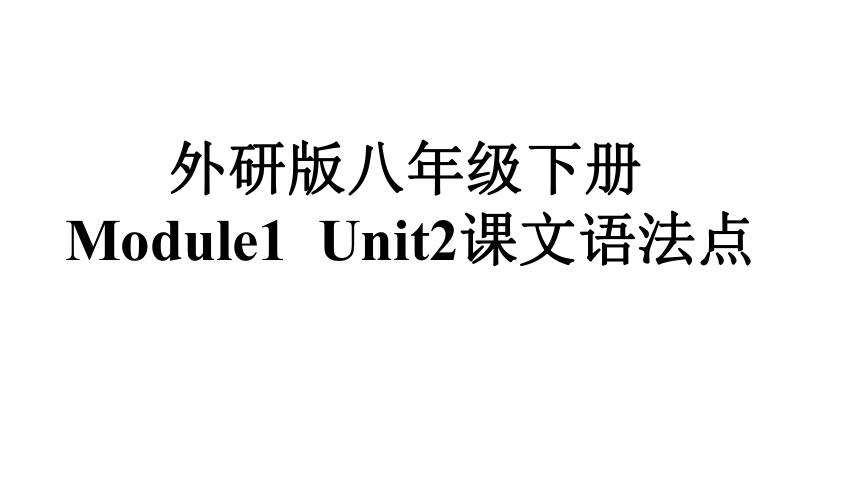
|
|
| 格式 | zip | ||
| 文件大小 | 125.2KB | ||
| 资源类型 | 教案 | ||
| 版本资源 | 外研版 | ||
| 科目 | 英语 | ||
| 更新时间 | 2020-03-18 00:00:00 | ||
图片预览

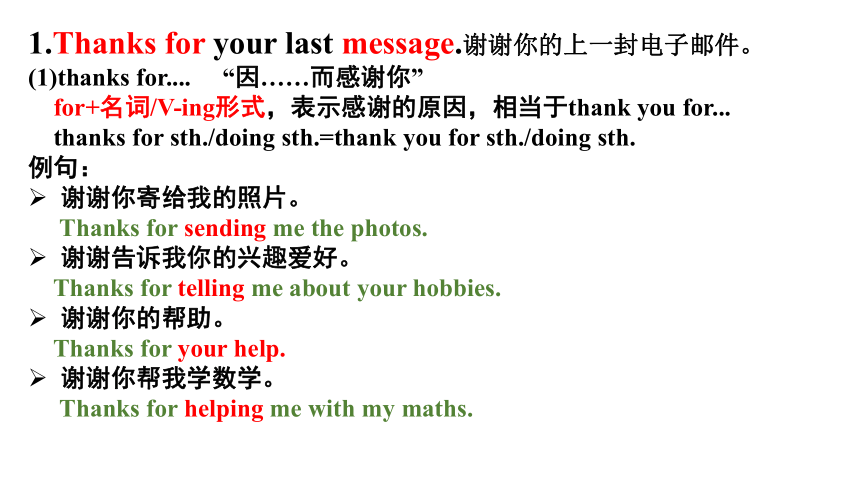
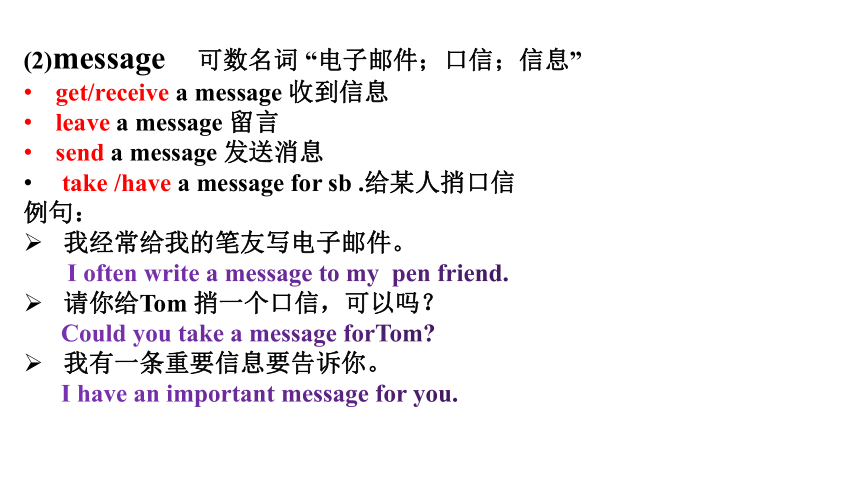
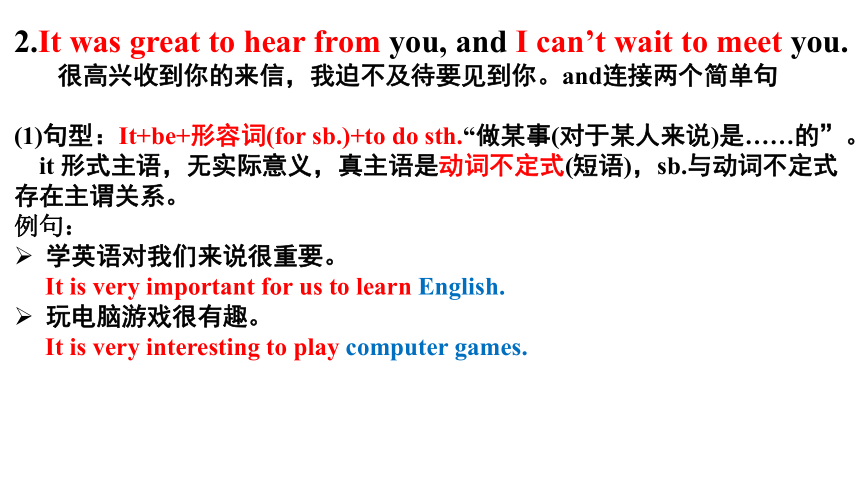
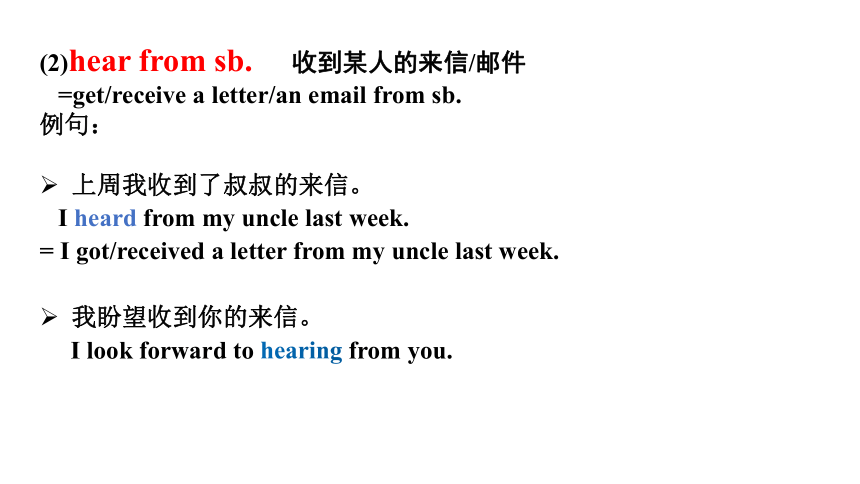

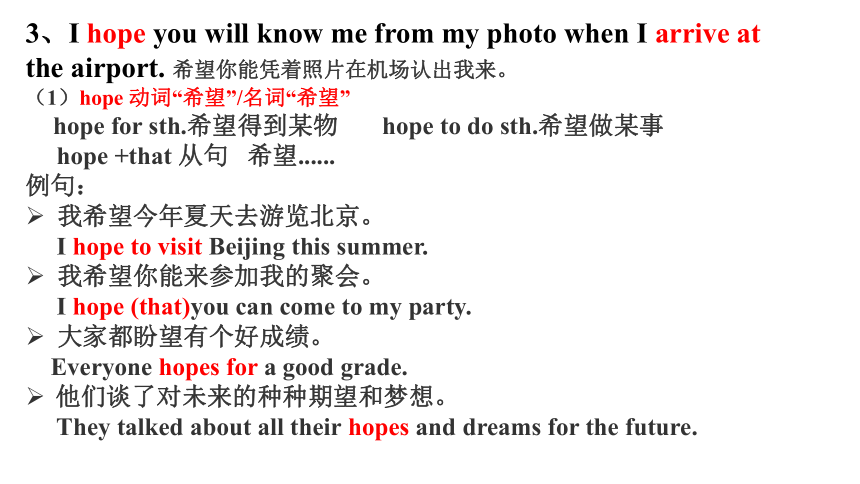
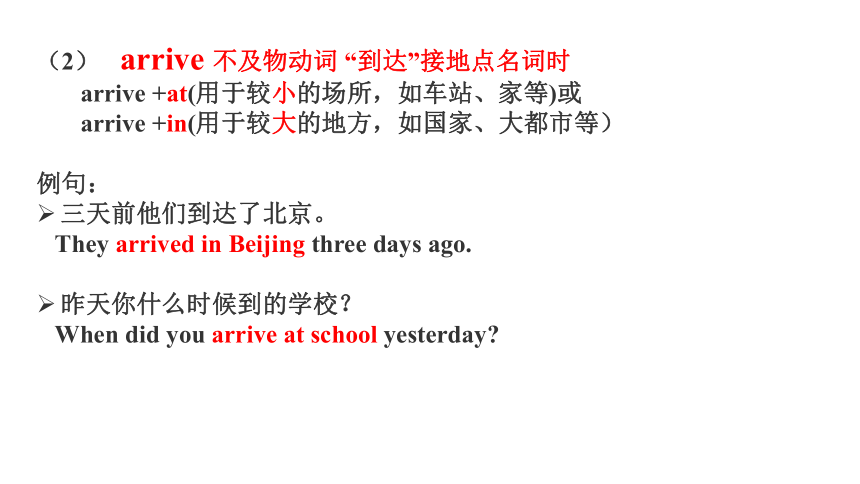

文档简介
(共25张PPT)
外研版八年级下册 Module1 Unit2课文语法点
1.Thanks for your last message.谢谢你的上一封电子邮件。
(1)thanks for.... “因……而感谢你”
for+名词/V-ing形式,表示感谢的原因,相当于thank you for...
thanks for sth./doing sth.=thank you for sth./doing sth.
例句:
谢谢你寄给我的照片。
Thanks for sending me the photos.
谢谢告诉我你的兴趣爱好。
Thanks for telling me about your hobbies.
谢谢你的帮助。
Thanks for your help.
谢谢你帮我学数学。
Thanks for helping me with my maths.
(2)message 可数名词 “电子邮件;口信;信息”
get/receive a message 收到信息
leave a message 留言
send a message 发送消息
take /have a message for sb .给某人捎口信
例句:
我经常给我的笔友写电子邮件。
I often write a message to my pen friend.
请你给Tom 捎一个口信,可以吗?
Could you take a message forTom?
我有一条重要信息要告诉你。
I have an important message for you.
2.It was great to hear from you, and I can’t wait to meet you.
很高兴收到你的来信,我迫不及待要见到你。and连接两个简单句
(1)句型:It+be+形容词(for sb.)+to do sth.“做某事(对于某人来说)是……的”。
it 形式主语,无实际意义,真主语是动词不定式(短语),sb.与动词不定式存在主谓关系。
例句:
学英语对我们来说很重要。
It is very important for us to learn English.
玩电脑游戏很有趣。
It is very interesting to play computer games.
(2)hear from sb. 收到某人的来信/邮件
=get/receive a letter/an email from sb.
例句:
上周我收到了叔叔的来信。
I heard from my uncle last week.
= I got/received a letter from my uncle last week.
我盼望收到你的来信。
I look forward to hearing from you.
(3)can’t wait to do sth. “等不及做某事”或“迫不及待做某事”。
sb can’t wait to do sth. 某人等不及做某事
例句:
他迫不及待地要回家。
He can’t wait to go home.
我今晚要去看那部新电影。我等不及了。
I'm going to watch the new movie tonight. I can't wait.
我们等不及要见到我们的新老师了。
We can't wait to meet our new teacher.
3、I hope you will know me from my photo when I arrive at the airport. 希望你能凭着照片在机场认出我来。
(1)hope 动词“希望”/名词“希望”
hope for sth.希望得到某物 hope to do sth.希望做某事
hope +that 从句 希望......
例句:
我希望今年夏天去游览北京。
I hope to visit Beijing this summer.
我希望你能来参加我的聚会。
I hope (that)you can come to my party.
大家都盼望有个好成绩。
Everyone hopes for a good grade.
他们谈了对未来的种种期望和梦想。
They talked about all their hopes and dreams for the future.
(2) arrive 不及物动词 “到达”接地点名词时
arrive +at(用于较小的场所,如车站、家等)或
arrive +in(用于较大的地方,如国家、大都市等)
例句:
三天前他们到达了北京。
They arrived in Beijing three days ago.
昨天你什么时候到的学校?
When did you arrive at school yesterday?
4、I’m quite tall, with short fair hair, and I wear glasses.
我的个子比较高,留着一头金色短发,戴眼镜。
(1)quite 副词“很;非常;相当” 可修饰形容词、副词或动词。
quite修饰形容词、副词时,相当于very
这个书包非常重。
This schoolbag is very /quite heavy.
Tom说英语说得相当好。
Tom speaks English very / quite well.
拓展:very 与quite
quite
①quite +a/an+形容词+可数名词单数
一个相当可爱的男孩
quite a nice boy
②修饰动词时放在动词之前
Tom很喜欢英语。
Tom quite likes English.
very
①a+very+形容词+可数名词单数
一个很可爱的男孩
a very nice boy
②very与much合在一起修饰动词,一般位于句末。
Tom很喜欢英语。
Tom likes English very much.
(2)fair 形容词“(头发)金色的”/公平的;合理的
Lucy 有一头金色长发。
Lucy has long fair hair.
生活并不总是公平的。
Life is not always fair.
(3)wear及物动词 “ 穿;戴”
拓展 wear,dress,put on ,(be)in ,have...on
①wear“ 穿;戴”,强调状态,宾语:衣帽、鞋袜、饰品、奖章等
Tom戴眼镜。
Tom wears glasses.
②dress “给某人穿衣服” 强调动作,宾语:人 dress oneself/get dressed等
他太小还不会自己穿衣服。
He's too young to dress himself.
③put on “穿上;戴上 ”强调动作,宾语:衣帽、鞋袜等。
你最好多穿点衣服。
You'd better put on more clothes.
④(be)in “穿着;戴着 ”强调状态,宾语:服装的颜色/款式
那个穿蓝色衣服的男孩是Tom。
The boy in blue is Tom.
⑤have...on“穿着;戴着 ......”强调状态.无进行时态。
Lucy 今天穿着白色的鞋子。
Lucy has white shoes on today.
5、I spend a lot of time playing classical music with my friends at school. 我花很多时间在学校和朋友弹奏古典音乐。
拓展:spend,take,cost, pay
①pend : 主语:人 花费......金钱/时间 在某物上/做某事
sb spend some money/time on sth.
sb spend some money/time (in) doing sth.
Tom每年花很多钱买书。
Tom spends a lot of money on books every year.
我花了一个小时做家庭作业。
I spent an hour (in) doing my homework.
②take :主语:it 花费时间 做某事花费某人......时间
it takes sb some time to do sth.
我用了大约三十分钟到学校。
It took me about thirty minutes to get to school.
③cost 主语: 物 花费金钱
sth. cost sb some money
这条裙子花了我30元。
The skirt cost me 30 yuan.
④pay 主语: 人 买某物花费金钱
sb pay .....for.....
这件礼物花了我100元。
I paid 100 yuan for the gift .
6、I enjoy sports as well, especially tennis. 我也喜欢运动,尤其是网球。
拓展:too, as well,also, either
①too /as well 表示“也”常用于口语中,多用于肯定句句末,too 还可用于一般疑问句。
Tom也喜欢阅读。
Tom likes reading, too.
Tom likes reading as well .
②also 表示“也” 一般用于肯定句,
位于实义动词之前,助动词、be动词、情态动词之后。
他也会说英语。
He can also speaks English.
③either 表示“也(不)” 一般只用于否定句句末。
他也不想去。
He doesn't want to go,either.
②enjoy 及物动词“享受;喜爱” enjoy +名词/代词/V-ing形式做宾语
enjoy oneself 玩的开心 =have a good time
enjoy doing sth.喜欢做某事
我喜欢吃香蕉。
I enjoy eating bananas.
我喜欢这个聚会。
I enjoy the party.
我们在北京正过得很愉快。
We are having a good time in Beijing.
We are enjoying ourselves in Beijing.
③especially 副词“尤其” 可修饰形容词/副词/动词
他尤其擅长英语。
He is especially good at English.
7、My?brother?is?in?the?school?tennis?team?–?I’m?very?proud?of?
him! 我哥哥在我们学校网球队,我为他感到非常自豪。
(1)proud为形容词
be proud of…为……而感到骄傲,
be proud that ....自豪/骄傲......
be proud to do sth.做某事自豪/骄傲
我们为祖国而骄傲。
We are proud of our country.
我以她是我母亲为荣。
I'm proud that she's my mother.
我为获得这样的机会而感到骄傲。
I'm proud to be given such a chance.
8、He's?good?at?everything,?but?I'm?not.他各方面都很优秀,而我不行。
①be good at 意思是“擅长…”后跟名词、代词或V-ing形式。
同义短语 do well in ,更强调某一次做的好
他擅长英语。
He is good at English .
她擅长唱歌。
She is good at singing .
他们擅长打篮球。
They are good at playing basketball .
②be good to意为“对……友好”
玲玲对别人总是很友好。
Lingling is always good to others.
③be good for意为 “对……有益”
多吃蔬菜对你的健康有好处。
Eating more vegetables is good for your health.
④be bad for意为 “对……有害”
吸烟有害健康.
Smoking is bad for your health.
9、I?feel?nervous?when?I?speak?Chinese,?but?I’ll?be?fine?in?a?few?days.
讲汉语时我会感到紧张。但是过几天就好了。
?
(1)nervous?形容词“情绪不安的;紧张的”
be nervous? about 因......而紧张
考试让她很紧张。
She was very nervous about her exams.
(2)?in?a?few?days“几天之后”
① in+一段时间 “在......之后” 一般将来时,提问:How soon
一周后他们将到达这里
They'll get here in a week.
②拓展 few, a few,little, a little
few ,a few+可数名词复数 little, a little +不可数名词
a few,a little表肯定“一些几个” few,little 表否定“几乎没有,很少”。
例句:
我想买一些书。
I want to buy a few books.
冰箱里没有多少鸡蛋了。
There are few eggs in the fridge.
碗里没有多少米饭了。
There is little rice in the bowl.
我只会说一点英语。
I can only speak a little English.
10、I'm?always?sorry?when?I?don’t?know?how?to?do?things?in?the?right?way.
我不知道该如何正确处理事情时,心里总是难过.
①how?to?do?things特殊疑问词+动词不定式,做know 的宾语。
疑问代词/副词what, which, how , when, who,+动词不定式,可做主.宾.表语。
特殊疑问词+动词不定式 ,做主语时,谓语动词用单数。
什么时候动身还没决定。
When to start is not decided yet.
你知道怎么处理它吧?
Do you know how to deal with it?
问题是下一步做什么。
The question is what to do next.
注意:
特殊疑问词+动词不定式,做宾语时常放在
know,tell,wonder,ask,learn,decide,find out 等之后。
11.I’m afraid of flying too.我还害怕坐飞机。
afraid 形容词 “害怕的;犯愁的”
be afraid of doing sth… 担心/害怕会发生某事
be afraid to do sth. 因害怕而不敢做某事
Tom 不敢爬树,因为他怕从树上掉下来。
Tom was afraid to climb the tree ,for he was afraid of falling down from it.
12、But I can’t tell you how excited I am about going to China! 但是对于去中国,你不知道我有多兴奋!
excited “感到兴奋的、激动的” 作表语时,主语一般为人,人的心理感受。
exciting “令人兴奋的”作表语时,主语一般为物,某事(物)给人的感觉。
be excited about....“对......感到兴奋” about 介词+名词、代词或V-ing形式。
对于这次旅行,我们兴奋极了。
We are so excited about the trip.
他对北京之行感到非常兴奋。
He was excited about going to Beijing.
我们对这条激动人心的消息感到非常激动。
We are very excited about the exciting news.
Thanks for listening
Produced by Wangjie
临邑县兴隆镇中学 王杰
外研版八年级下册 Module1 Unit2课文语法点
1.Thanks for your last message.谢谢你的上一封电子邮件。
(1)thanks for.... “因……而感谢你”
for+名词/V-ing形式,表示感谢的原因,相当于thank you for...
thanks for sth./doing sth.=thank you for sth./doing sth.
例句:
谢谢你寄给我的照片。
Thanks for sending me the photos.
谢谢告诉我你的兴趣爱好。
Thanks for telling me about your hobbies.
谢谢你的帮助。
Thanks for your help.
谢谢你帮我学数学。
Thanks for helping me with my maths.
(2)message 可数名词 “电子邮件;口信;信息”
get/receive a message 收到信息
leave a message 留言
send a message 发送消息
take /have a message for sb .给某人捎口信
例句:
我经常给我的笔友写电子邮件。
I often write a message to my pen friend.
请你给Tom 捎一个口信,可以吗?
Could you take a message forTom?
我有一条重要信息要告诉你。
I have an important message for you.
2.It was great to hear from you, and I can’t wait to meet you.
很高兴收到你的来信,我迫不及待要见到你。and连接两个简单句
(1)句型:It+be+形容词(for sb.)+to do sth.“做某事(对于某人来说)是……的”。
it 形式主语,无实际意义,真主语是动词不定式(短语),sb.与动词不定式存在主谓关系。
例句:
学英语对我们来说很重要。
It is very important for us to learn English.
玩电脑游戏很有趣。
It is very interesting to play computer games.
(2)hear from sb. 收到某人的来信/邮件
=get/receive a letter/an email from sb.
例句:
上周我收到了叔叔的来信。
I heard from my uncle last week.
= I got/received a letter from my uncle last week.
我盼望收到你的来信。
I look forward to hearing from you.
(3)can’t wait to do sth. “等不及做某事”或“迫不及待做某事”。
sb can’t wait to do sth. 某人等不及做某事
例句:
他迫不及待地要回家。
He can’t wait to go home.
我今晚要去看那部新电影。我等不及了。
I'm going to watch the new movie tonight. I can't wait.
我们等不及要见到我们的新老师了。
We can't wait to meet our new teacher.
3、I hope you will know me from my photo when I arrive at the airport. 希望你能凭着照片在机场认出我来。
(1)hope 动词“希望”/名词“希望”
hope for sth.希望得到某物 hope to do sth.希望做某事
hope +that 从句 希望......
例句:
我希望今年夏天去游览北京。
I hope to visit Beijing this summer.
我希望你能来参加我的聚会。
I hope (that)you can come to my party.
大家都盼望有个好成绩。
Everyone hopes for a good grade.
他们谈了对未来的种种期望和梦想。
They talked about all their hopes and dreams for the future.
(2) arrive 不及物动词 “到达”接地点名词时
arrive +at(用于较小的场所,如车站、家等)或
arrive +in(用于较大的地方,如国家、大都市等)
例句:
三天前他们到达了北京。
They arrived in Beijing three days ago.
昨天你什么时候到的学校?
When did you arrive at school yesterday?
4、I’m quite tall, with short fair hair, and I wear glasses.
我的个子比较高,留着一头金色短发,戴眼镜。
(1)quite 副词“很;非常;相当” 可修饰形容词、副词或动词。
quite修饰形容词、副词时,相当于very
这个书包非常重。
This schoolbag is very /quite heavy.
Tom说英语说得相当好。
Tom speaks English very / quite well.
拓展:very 与quite
quite
①quite +a/an+形容词+可数名词单数
一个相当可爱的男孩
quite a nice boy
②修饰动词时放在动词之前
Tom很喜欢英语。
Tom quite likes English.
very
①a+very+形容词+可数名词单数
一个很可爱的男孩
a very nice boy
②very与much合在一起修饰动词,一般位于句末。
Tom很喜欢英语。
Tom likes English very much.
(2)fair 形容词“(头发)金色的”/公平的;合理的
Lucy 有一头金色长发。
Lucy has long fair hair.
生活并不总是公平的。
Life is not always fair.
(3)wear及物动词 “ 穿;戴”
拓展 wear,dress,put on ,(be)in ,have...on
①wear“ 穿;戴”,强调状态,宾语:衣帽、鞋袜、饰品、奖章等
Tom戴眼镜。
Tom wears glasses.
②dress “给某人穿衣服” 强调动作,宾语:人 dress oneself/get dressed等
他太小还不会自己穿衣服。
He's too young to dress himself.
③put on “穿上;戴上 ”强调动作,宾语:衣帽、鞋袜等。
你最好多穿点衣服。
You'd better put on more clothes.
④(be)in “穿着;戴着 ”强调状态,宾语:服装的颜色/款式
那个穿蓝色衣服的男孩是Tom。
The boy in blue is Tom.
⑤have...on“穿着;戴着 ......”强调状态.无进行时态。
Lucy 今天穿着白色的鞋子。
Lucy has white shoes on today.
5、I spend a lot of time playing classical music with my friends at school. 我花很多时间在学校和朋友弹奏古典音乐。
拓展:spend,take,cost, pay
①pend : 主语:人 花费......金钱/时间 在某物上/做某事
sb spend some money/time on sth.
sb spend some money/time (in) doing sth.
Tom每年花很多钱买书。
Tom spends a lot of money on books every year.
我花了一个小时做家庭作业。
I spent an hour (in) doing my homework.
②take :主语:it 花费时间 做某事花费某人......时间
it takes sb some time to do sth.
我用了大约三十分钟到学校。
It took me about thirty minutes to get to school.
③cost 主语: 物 花费金钱
sth. cost sb some money
这条裙子花了我30元。
The skirt cost me 30 yuan.
④pay 主语: 人 买某物花费金钱
sb pay .....for.....
这件礼物花了我100元。
I paid 100 yuan for the gift .
6、I enjoy sports as well, especially tennis. 我也喜欢运动,尤其是网球。
拓展:too, as well,also, either
①too /as well 表示“也”常用于口语中,多用于肯定句句末,too 还可用于一般疑问句。
Tom也喜欢阅读。
Tom likes reading, too.
Tom likes reading as well .
②also 表示“也” 一般用于肯定句,
位于实义动词之前,助动词、be动词、情态动词之后。
他也会说英语。
He can also speaks English.
③either 表示“也(不)” 一般只用于否定句句末。
他也不想去。
He doesn't want to go,either.
②enjoy 及物动词“享受;喜爱” enjoy +名词/代词/V-ing形式做宾语
enjoy oneself 玩的开心 =have a good time
enjoy doing sth.喜欢做某事
我喜欢吃香蕉。
I enjoy eating bananas.
我喜欢这个聚会。
I enjoy the party.
我们在北京正过得很愉快。
We are having a good time in Beijing.
We are enjoying ourselves in Beijing.
③especially 副词“尤其” 可修饰形容词/副词/动词
他尤其擅长英语。
He is especially good at English.
7、My?brother?is?in?the?school?tennis?team?–?I’m?very?proud?of?
him! 我哥哥在我们学校网球队,我为他感到非常自豪。
(1)proud为形容词
be proud of…为……而感到骄傲,
be proud that ....自豪/骄傲......
be proud to do sth.做某事自豪/骄傲
我们为祖国而骄傲。
We are proud of our country.
我以她是我母亲为荣。
I'm proud that she's my mother.
我为获得这样的机会而感到骄傲。
I'm proud to be given such a chance.
8、He's?good?at?everything,?but?I'm?not.他各方面都很优秀,而我不行。
①be good at 意思是“擅长…”后跟名词、代词或V-ing形式。
同义短语 do well in ,更强调某一次做的好
他擅长英语。
He is good at English .
她擅长唱歌。
She is good at singing .
他们擅长打篮球。
They are good at playing basketball .
②be good to意为“对……友好”
玲玲对别人总是很友好。
Lingling is always good to others.
③be good for意为 “对……有益”
多吃蔬菜对你的健康有好处。
Eating more vegetables is good for your health.
④be bad for意为 “对……有害”
吸烟有害健康.
Smoking is bad for your health.
9、I?feel?nervous?when?I?speak?Chinese,?but?I’ll?be?fine?in?a?few?days.
讲汉语时我会感到紧张。但是过几天就好了。
?
(1)nervous?形容词“情绪不安的;紧张的”
be nervous? about 因......而紧张
考试让她很紧张。
She was very nervous about her exams.
(2)?in?a?few?days“几天之后”
① in+一段时间 “在......之后” 一般将来时,提问:How soon
一周后他们将到达这里
They'll get here in a week.
②拓展 few, a few,little, a little
few ,a few+可数名词复数 little, a little +不可数名词
a few,a little表肯定“一些几个” few,little 表否定“几乎没有,很少”。
例句:
我想买一些书。
I want to buy a few books.
冰箱里没有多少鸡蛋了。
There are few eggs in the fridge.
碗里没有多少米饭了。
There is little rice in the bowl.
我只会说一点英语。
I can only speak a little English.
10、I'm?always?sorry?when?I?don’t?know?how?to?do?things?in?the?right?way.
我不知道该如何正确处理事情时,心里总是难过.
①how?to?do?things特殊疑问词+动词不定式,做know 的宾语。
疑问代词/副词what, which, how , when, who,+动词不定式,可做主.宾.表语。
特殊疑问词+动词不定式 ,做主语时,谓语动词用单数。
什么时候动身还没决定。
When to start is not decided yet.
你知道怎么处理它吧?
Do you know how to deal with it?
问题是下一步做什么。
The question is what to do next.
注意:
特殊疑问词+动词不定式,做宾语时常放在
know,tell,wonder,ask,learn,decide,find out 等之后。
11.I’m afraid of flying too.我还害怕坐飞机。
afraid 形容词 “害怕的;犯愁的”
be afraid of doing sth… 担心/害怕会发生某事
be afraid to do sth. 因害怕而不敢做某事
Tom 不敢爬树,因为他怕从树上掉下来。
Tom was afraid to climb the tree ,for he was afraid of falling down from it.
12、But I can’t tell you how excited I am about going to China! 但是对于去中国,你不知道我有多兴奋!
excited “感到兴奋的、激动的” 作表语时,主语一般为人,人的心理感受。
exciting “令人兴奋的”作表语时,主语一般为物,某事(物)给人的感觉。
be excited about....“对......感到兴奋” about 介词+名词、代词或V-ing形式。
对于这次旅行,我们兴奋极了。
We are so excited about the trip.
他对北京之行感到非常兴奋。
He was excited about going to Beijing.
我们对这条激动人心的消息感到非常激动。
We are very excited about the exciting news.
Thanks for listening
Produced by Wangjie
临邑县兴隆镇中学 王杰
同课章节目录
- Module 1 Feelings and impressions
- Unit 1 It smells delicious.
- Unit 2 I feel nervous when I speak Chinese .
- Unit 3 Language in use
- Module 2 Experiences
- Unit 1 I've also entered lots of speaking competi
- Unit 2 They have seen the Pyramids.
- Unit 3 Language in use
- Module 3 Journey to space
- Unit 1 Has it arrived yet?
- Unit 2 We have not found life on any other planet
- Unit 3 Language in use
- Module 4 Seeing the docto
- Unit 1 I haven't done much exercise since I got m
- Unit 2 We have played football for a year now
- Unit 3 Language in use
- Module 5 Cartoons
- Unit 1 It's time to watch a cartoon.
- Unit 2 Tintin has been popular for over eighty yea
- Unit 3 Language in use
- Revision module A
- Module 6 Hobbies
- Unit 1 Do you collect anything ?
- Unit 2 Hobbies can make you grow as a person.
- Unit 3 Language in use
- Module 7 Summer in Los Angeles
- Unit 1 Please write to me and send me some photos
- Unit 2 Fill out a form and come to learn English
- Unit 3 Language in use
- Module 8 Time off
- Unit 1 I can hardly believe we are in the city ce
- Unit 2 We thought somebody was moving about
- Unit 3 Language in use
- Module 9 Friendship
- Unit 1 Could I ask if you've mentioned this to he
- Unit 2 I believe that the world is what you think
- Unit 3 Language in use
- Module 10 On the radio
- Unit 1 I hope that you can join us one day
- Unit 2 It seemed that they were speaking to me in
- Unit 3 Language in use
- Revision module B
